- Home
- Captain W E Johns
10 Biggles and Co
10 Biggles and Co Read online
The word 'Hun' used in this book was the generic term for anything belonging to the German enemy. It was used in a familiar sense, rather than derogatory. Witness the fact that in the R.F.0 a hun was also a pupil at a flying training school.
W.EJ
Chapter 1
The Proposition
Major James Bigglesworth, D.S.O., D.F.C., more often known as 'Biggles', glanced down over the side of the aeroplane he was testing to where his two friends, Algy Lacey, of his old squadron, and 'Ginger' Hebblethwaite, his youthful protege, were waiting impatiently outside the hangars of Brooklands Aerodrome. With the familiarity of long practice he throttled back the engine, eased the joystick forward, and then side-slipped steeply towards the ground, levelling out over the famous motor track to glide in to a clean, three-point landing. The machine finished its run within a dozen yards from where the others were standing.
'There's a fellow waiting to speak to you,' Algy told him, as he jumped to the ground, pushed up his goggles, and began unbuttoning his leather coat.
'What does he want?'
'He won't say.'
'Who is he?'
'I've no idea. I told him I was a friend of yours, but he just said he'd wait. Seems a churlish sort of cove—this is him, coming now.'
Biggles stepped forward and looked up inquiringly as a dark, broad-shouldered, heavily built man of about fifty years of age approached confidently. He was immaculate in town clothes of perfect cut, wore a bowler
hat, and carried an umbrella over the crook of his arm; altogether an unusual figure to be seen in an aerodrome normally devoted to sporting flying.
`Major Bigglesworth?' he inquired, in a brisk, almost peremptory tone, as he walked up.
`That is my name, sir,' replied Biggles evenly. 'Can I do something for you?'
Ì would like to have a few words with you,' replied the other.
`Well, here I am. There's nothing to stop you,' smiled Biggles.
Ì'm sorry, but —' The stranger indicated the others who were standing near, with a slight inclination of his head.
'They needn't stop you,' Biggles assured him quietly. 'They're both old friends of mine.'
'My business is of a very confidential—I might say secret—nature.'
Ì've no secrets from my friends,' Biggles told him frankly.
Ì'd rather speak to you alone. By the way, Colonel Raymond suggested that I came.'
Piggies started. 'Raymond, eh?' he ejaculated. 'Why didn't you say that at once? But what'
s the hurry? Couldn't you have 'phoned me, and asked me to meet you in town?'
`The matter is pressing. I've just spoken to Colonel Raymond at Scotland Yard. He looked you up in the telephone directory and rang up your rooms, but was told you were here. So I came down immediately in my car.'
Biggles looked past the speaker's shoulder to where a Rolls-Royce, with a liveried chauffeur in the driver's seat, stood outside the club-house. 'What's Raymond doing at Scotland Yard? he asked with interest. 'lie was my Wing Intelligence Officer during the war; we had some great times together.'
`So I gather. He is now Assistant Commissioner of Police. Didn't you know?'
Biggles opened his eyes wide. 'No,' he confessed, 'I'm dashed if I did. I'm glad to hear it, anyway, for he is a great scout.'
`Well, he advised me to see you.'
`Then it must be something important.'
'It is—very important.'
'I see. Very well, then.' Biggles turned to the others. 'Hang around for a bit; I'll be back presently,' he told them, and then led the way to the club-house. Now, sir,' he continued, when they had found a quiet corner, `what's the trouble?'
The stranger took a card from a case and passed it across the table.
Biggles took it and looked at it curiously. This is what he saw:
He handed it back with a faint smile. 'If it's bullion or diamonds you want, I'm afraid there's nothing doing,' he murmured. 'I've never had any quantity of either.'
'I've quite a lot of both,' replied the other coolly, 'and that is why I'm here. I want to start an airline.'
Biggles raised his eyebrows. 'Well, that shouldn't be difficult. What's stopping you?' he inquired..
Cronfelt ignored the question. 'Could you run an airline?' he asked abruptly.
'I've never tried, but I shouldn't be surprised if I could,' returned Biggles.
The other settled himself a little lower in his chair and leaned forward confidentially. 'I can see you do not take the matter very seriously,' he said quietly. 'Perhaps I had better explain the position more dearly.'
'That would be a good idea. I'm listening,' Biggles told him.
Cronfelt took out a cigar, lighted it, and glanced round, presumably to make sure that no one was within hearing. 'We—that is, my firm, Cronfelt and Carstairs—are, as my card informed you, dealers in gold and precious stones,' he began. 'Now, as you must be aware, the instability of currencies in Europe and America at the present time makes it necessary for shipments of gold to be made from one country to another. When that happens, speed is everything, for two very good reasons. In the first place the gold is earning no interest while it is in transit; and in the second, there is always the risk of a currency fluctuation which may seriously affect the deal. That is why gold is now nearly always sent by air.'
'Yes, I understand that.'
'Very well. Now then. Up to the present, or to be more accurate, until recently, it has been the practice of my firm to send metal abroad, when the necessity arose, by an established air operating company. Usually it went from Croydon. You have no doubt seen references made in the newspapers to shipments of gold by air; I suppose they think the idea is still novel, but actually it has been going on for years.
`Now we had no trouble of any sort until about eight months ago, when we sent a large consignment of gold — nearly forty thousand pounds' worth—to Paris. It went in a large airliner. By a piece of good fortune, there happened to be a full quota of passengers that day on the regular service, which made it impossible to send the gold in the same aeroplane; so at the last minute a special one was put on. It crashed in northern France.
Both pilots and the wireless operator were killed. You may remember the occurrence.'
`Was that the crash in which Geoffrey Lyle was killed?'
Cronfelt nodded. `That was it,' he said.
Biggles puckered his forehead. `But I didn't see anything about gold in the papers, and I read the case carefully,' he exclaimed. 'I knew Lyle well.'
No, you didn't, for the simple reason that the papers knew nothing about the gold—at least, not at the time. The police suspected foul play and issued only half a story to the press. We, the airline authorities, the insurance brokers, and the police alone knew about the gold.'
`But why should the police suspect foul play?'
Cronfelt studied the glowing end of his cigar for a moment. Then he looked up. 'Because,
' he said slowly, `the gold disappeared.'
`Good heavens!'
`What is more, it has never been recovered,' added Cronfelt.
A low whistle escaped Biggles' lips. 'That puts a different complexion on the crash,' he admitted.
Cronfelt smiled wanly. Ì thought you'd think that,'
he said. 'But let me go on: I haven't finished the story by a long way. The immediate result of that crash was an increase in the insurance rates. That may not convey much to you, but it meant a lot to us. In fact, it meant that unless there was a fairly wide margin of profit on the turnover, the insurance and freight charges absorbed it all. However, we went on, and several small consignments got through all right. Then we sent another big lot. It never arrived.'
'Stolen en mute, eh?'
'We don't know. The machine never arrived.' 'What do you suppose happened to it?'
Cronfelt shrugged his shoulders. 'That's what we should like to know. Some pieces of wreckage—fabric and splinters—were found floating in the Channel, so it was assumed the machine was lost at sea. It was one of the twin-engined sort—I forget the name.
There were four passengers on board, as well as the pilot. Their bodies were never found.
'
'That's pretty grim.'
'Very grim indeed. Result, another increase in insurance rates, and, what is worse, a disinclination on the part of the airline people to touch the gold at all. A rumour about the metal leaked out, and passengers began to jib at travelling when there was gold on board.
'
'I should think so, too.'
'Precisely. We ourselves could appreciate the point of view both of the public and of the airline people. Still, what was to be done? Well, the problem was solved for us in an unexpected way. A new German private company operating between European capitals approached us, and gave us a cut rate for transportation. The insurance rates were still high, of course, but the cut transport rate balanced them. We accepted, and as before all went well while we were only shipping small loads. Then, about a month ago, we sent a parcel of very good diamonds to Amsterdam. They were taken by a special courier. The machine arrived, but —'
The courier didn't?'
Èxactly. I see you keep up with a story very well.' `What happened to him?'
`We've no idea. It was presumed that he fell out of the machine whilst it was over the sea. A body was subsequently washed up, and identified as that of our courier, but it had been ravaged by sea-water, and it may or may not have been him. The body was naked, so of course the diamonds were not recovered.'
'Nasty business.'
'Apparently that is what the insurance people thought. They settled our claim, but the sum was a big one, and they set inquiries afoot. As a result of those inquiries they have issued us with a notice to the effect that they will not cover any more of our gold or diamond shipments while we employ the German transport company.'
'But there must be other insurance companies?'
'There are, but the one we dealt with was the largest, and the course they adopt goes for all. The German people are very sore about it, naturally, because it reflects badly on their reputation.'
'But what about the other bullion dealers? Haven't they had any trouble?'
'Their experience has been very much the same as ours, but we have been the biggest sufferers. Only one or two other firms deal with metal on the same scale as ourselves. As with us, one company had a load of gold disappear en route, and on another occasion a consignment was stolen at the airport.'
'I see,' replied Biggles slowly. 'I'm beginning to get the drift. Your idea is to run your own line?'
'That's it. Naturally, we shall not be concerned with passengers. It will be a private venture, financed by ourselves with the primary object of carrying our own freight, but open to carry other people's as and when circumstances permit. It is probable that we shall get charters from other bullion dealers.'
'But that would hardly be an airline,' Biggles pointed out. 'As I see it, you propose to own one or two aeroplanes that will be open to charter, but the transport of your own stuff would be the first consideration.'
'That is really what it amounts to. I might say that we didn't think of it. Scotland Yard has been interested in the train of events, and the other day Carstairs, my partner, whom I hope you will meet some time, went to the Yard and asked for advice. To be quite candid, I knew nothing about it, but he came back full of the idea. Colonel Raymond was the man he saw, so I went along this morning and had a few words with him myself. He was all in favour of the arrangement, and recommended—strongly recommended —me to come to you.'
'And you want me to run the thing for you?'
'If you will.'
'Have you any idea of how much such a show would cost, or for that matter, how much an aeroplane costs?' None whatever.'
'At a rough guess, I should say it will take fifty thousand pounds to start this concern in a business-like way. Running expenses are high, apart from the initial cost of machines.'
Cronfelt smiled. 'I thought you were going to say half a million,' he said. 'Fifty thousand pounds is a small
sum compared with the value of the freights we handle. You needn't worry about the financial side, if that is all it amounts to. If we do go on with it, we shall, of course, do the thing properly. Well, what do you say?'
`Will you give me a few hours to think it over?'
`Certainly. The matter is urgent, but there is no immediate hurry for a day or two. I hope you will join us, Major Bigglesworth. Naturally, we need a man who is both competent and reliable, and Colonel Raymond assures me that you possess both these virtues in a high degree.'
`That's very kind of him,' replied Biggles. took, Mr. Cronfelt, let us get this clear at the beginning. If I undertake this project I shall stipulate three things. They are definite, and as far as I am concerned, absolutely final.'
And they are?'
'One: I shall need staff. I can't run a thing like this single-handed.'
'Naturally.'
'I should demand to engage my own staff. I need hardly say that they would be men whose integrity is beyond question, men whom I have known for years.'
`That's reasonable. Go on.'
`Two: I should have to be at liberty to choose my own equipment.'
`We should expect you to; we're not air experts.'
'Three: I should want to run the thing my own way, without interference from you or any one else. You hand the freight to me at the aerodrome, and I'll do my best to see that it reaches its destination, but how I do it is nobody's business.'
Cronfelt hesitated. 'That might be awkward,' he mused.
'It might, from your point of view, but it would be a thundering sight more awkward for me if my machine shed its wings in the air. On your own admission, and without mincing matters, there's dirty work afoot. That being so, I handle things my own way or not at all.'
'But my partner and I —'
'I'm not prepared even to discuss the matter, Mr. Cronfelt,' put in Biggles brusquely. 'As I see it, you stand to lose some money, but I stand to lose my life. I set some value on it, so I shall expect to be paid in proportion to the risk; but more important is the fact that I must run things exactly as I like, without consulting even you. A secret shared by two or three people is no longer a secret. III know that only I know what I am doing, I shall know that no one else knows—which is a ham-fisted way of putting it, but you see what I mean?'
'Clearly, and I must confess that in your position I should feel the same way about it.
Very well, I'm agreeable; it only remains for you to agree and my partner to consent for you to go straight ahead. We should allow you to get everything you would be likely to require, having the accounts sent direct to us for payment. I should place a small sum of money in the bank, say a thousand pounds, in your name, on which you could draw to meet petty cash outlay. That would save you running to us for every shilling.'
'That's generous of you,' acknowledged Biggles. 'Well, I'll think it over and let you have my answer tonight.'
'Shall I ring you up, or will you ring me?'
'You ring me, about ten o'clock, at my rooms. Here's my card—the 'phone number is on it. I take it you've no objection to my mentioning the matter to my two friends outside?
They're pilots. They've flown with me
through all sorts of weather, and if I join you they will come with me.'
`They will, of course, regard the matter as confidential?'
`What I tell them Will go no farther, you may be quite sure of that,' Biggles assured him, as he stood up and saw Cronfelt to the door.
The bullion merchant took his seat in the Rolls. 'Ten o'clock,' he called, as the car glided away.
Biggles watched it disap
pear round the bend with a strange expression on his face. Then, deep in thought, he made his way back to the tarmac.
Later, in his rooms, he pushed back his coffee cup and glanced at the clock. `Nine o'
clock' he observed. 'We've got an hour to make up our minds.'
`Why our minds?' asked Algy quickly. 'You — '
Ì've told you the story pretty well word for word as he gave it to me because I want you to know just where we stand, and I'm not going on with this show without you. I can't handle it single-handed, and I wouldn't if I could; I certainly wouldn't chip in with strangers. It would be folly on a job of this sort. Either we take it on or we don't. Which is it to be?'
'In other words, you're leaving the decision to me?' "That's about it. If you say "No", then I'm through.
Say "Yes", and we're both in it up to the ceiling.' Ì'm full out for it,' put in Ginger.
`No doubt; but you'll do as we do,' Biggles told him. `Quite right, Chief,' answered Ginger quickly.
Algy rested his elbows on the table and ran his hands through his hair. 'I don't know what to say, and that's a fact,' he confessed. 'We've never tackled anything quite like this before. Why should we do it? What are we going to get out of it? Not very much, as far as I can see. We can't, in reason, ask for salaries that will make us rich for life, or anything like that; and it isn't as if we were in urgent need of money. Boiled down, it looks rather as if we should be taking on unknown risks without anything worth while to compensate for them. I don't mind a bit of trouble, but when it comes to taking on a bunch of crooks who are not beyond crashing a pilot for his cargo, just for the sake of obliging this fellow Cronfelt—
well, it isn't my idea of a business proposition. I'm getting old, and maybe I'm getting nervous.'
Biggles nodded. 'That's just about how I feel,' he said quietly. 'Is it worth it? That's the question I have been asking myself all the afternoon. Frankly, I don't think it is. I can get all the kick I want out of flying without taking on a job as a ferry pilot*, for that is what it amounts to. If things went well we should soon get bored with it; if they went wrong we might land ourselves in a nasty mess. If it were left to me to decide, my answer would be "No". Which, between you and me and the gate-post, is why I have left the decision to you.'

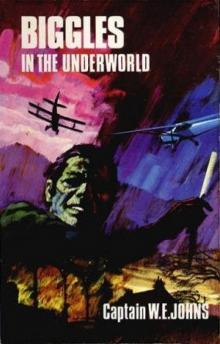 Biggles in the Underworld
Biggles in the Underworld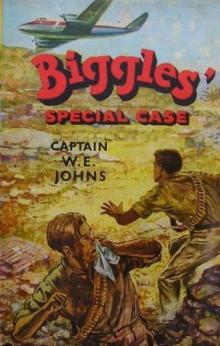 Biggles' Special Case
Biggles' Special Case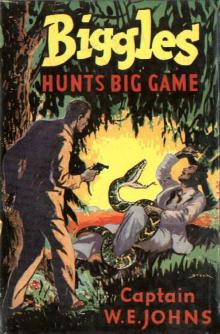 34 Biggles Hunts Big Game
34 Biggles Hunts Big Game 03 Now To The Stars
03 Now To The Stars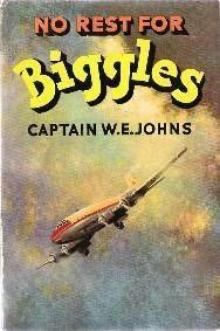 55 No Rest For Biggles
55 No Rest For Biggles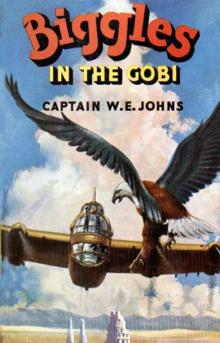 46 Biggles in the Gobi
46 Biggles in the Gobi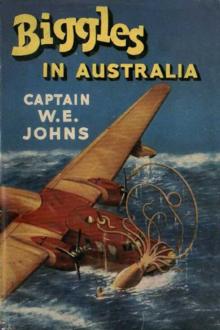 52 Biggles In Australia
52 Biggles In Australia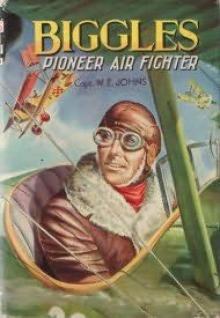 51 Biggles Pioneer Air Fighter
51 Biggles Pioneer Air Fighter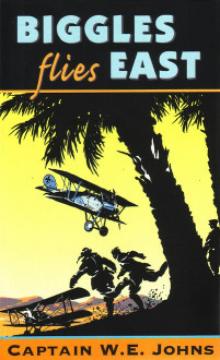 05 Biggles Flies East
05 Biggles Flies East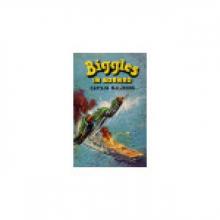 28 Biggles In Borneo
28 Biggles In Borneo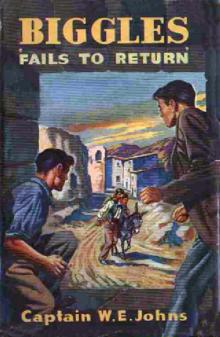 29 Biggles Fails to Return
29 Biggles Fails to Return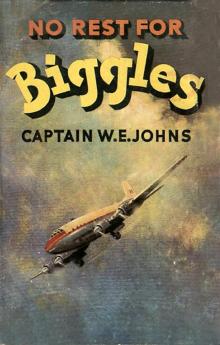 55 No Rest For Biggles (v2)
55 No Rest For Biggles (v2)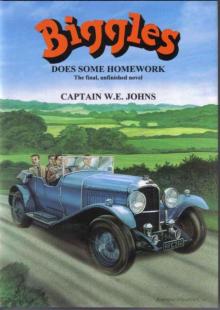 Biggles Does Some Homework
Biggles Does Some Homework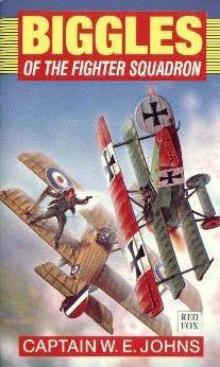 Biggles of the Camel Squadron
Biggles of the Camel Squadron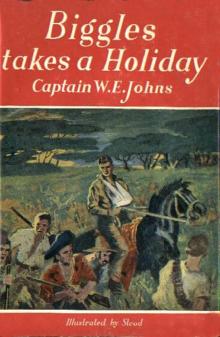 35 Biggles Takes A Holiday
35 Biggles Takes A Holiday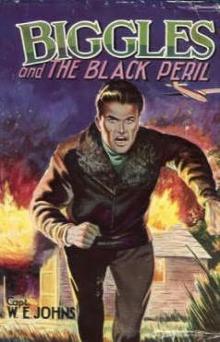 Biggles And The Black Peril (06)
Biggles And The Black Peril (06)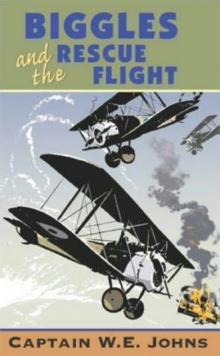 17 Biggles And The Rescue Flight
17 Biggles And The Rescue Flight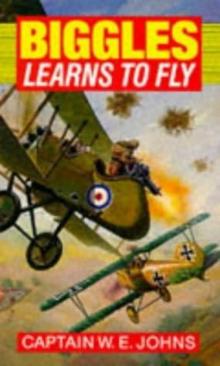 Biggles Learns To Fly
Biggles Learns To Fly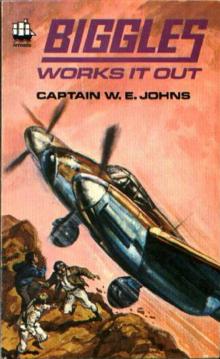 40 Biggles Works It Out
40 Biggles Works It Out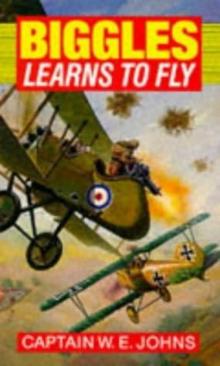 05 Biggles Learns To Fly
05 Biggles Learns To Fly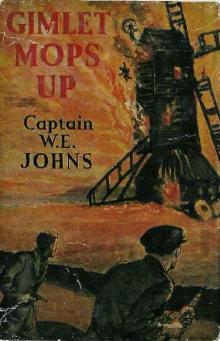 04 Gimlet Mops Up
04 Gimlet Mops Up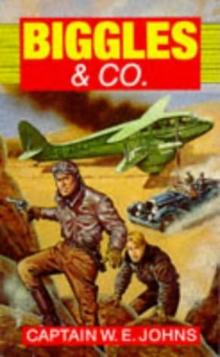 10 Biggles and Co
10 Biggles and Co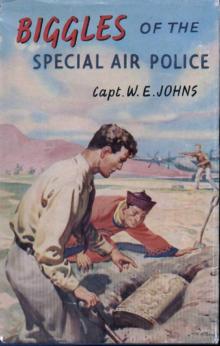 47 Biggles Of The Special Air Police
47 Biggles Of The Special Air Police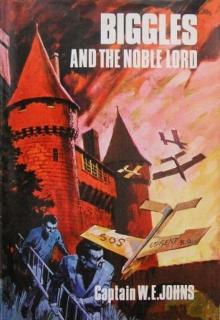 Biggles and the Noble Lord
Biggles and the Noble Lord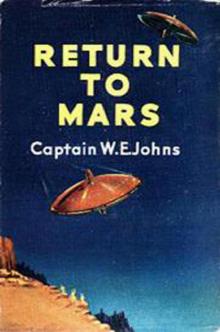 T2 Return To Mars
T2 Return To Mars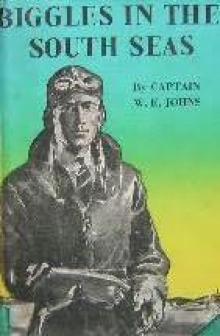 21 Biggles In the South Seas
21 Biggles In the South Seas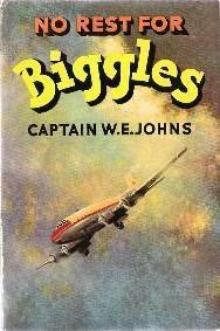 No Rest For Biggles
No Rest For Biggles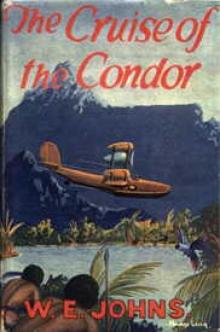 Biggles In The Cruise Of The Condor (02)
Biggles In The Cruise Of The Condor (02)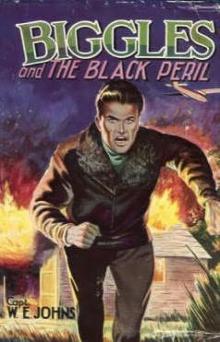 06 Biggles And The Black Peril
06 Biggles And The Black Peril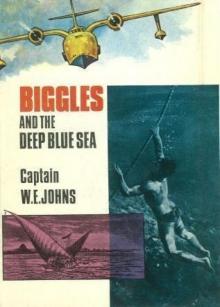 Biggles and the Deep Blue Sea
Biggles and the Deep Blue Sea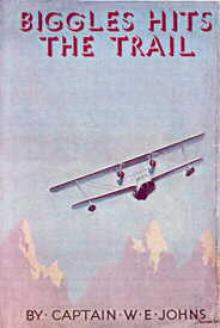 06 Biggles Hits The Trail
06 Biggles Hits The Trail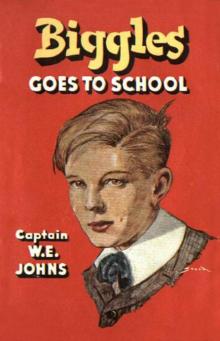 39 Biggles Goes To School
39 Biggles Goes To School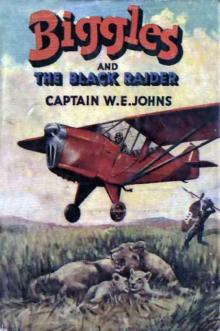 44 Biggles and the Black Raider
44 Biggles and the Black Raider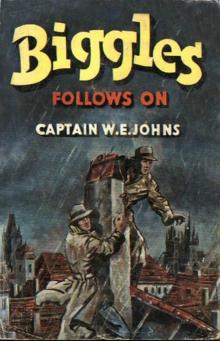 42 Biggles Follows On
42 Biggles Follows On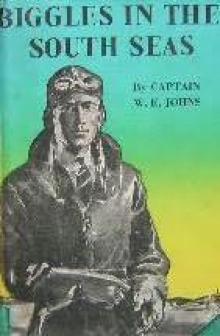 Biggles In the South Seas
Biggles In the South Seas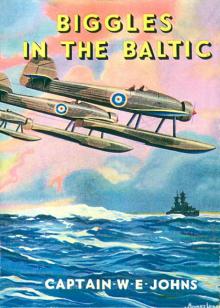 21 Biggles In The Baltic v3
21 Biggles In The Baltic v3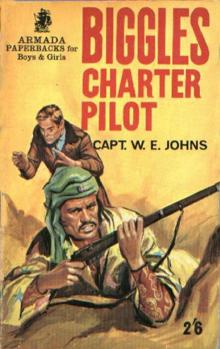 27 Biggles - Charter Pilot
27 Biggles - Charter Pilot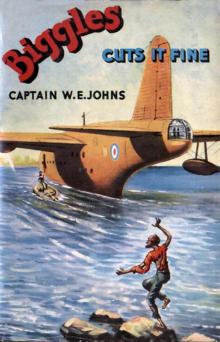 49 Biggles Cuts It Fine
49 Biggles Cuts It Fine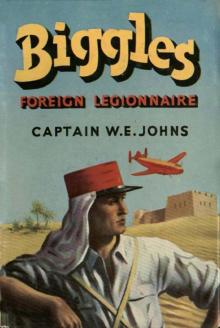 51 Biggles Foreign Legionaire
51 Biggles Foreign Legionaire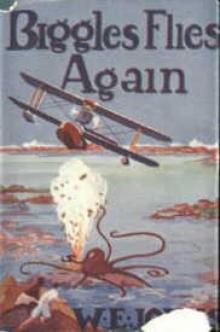 04 Biggles Flies Again
04 Biggles Flies Again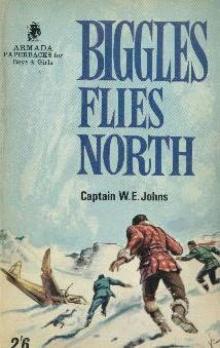 16 Biggles Flies North
16 Biggles Flies North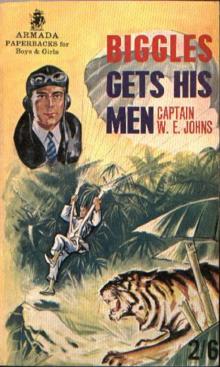 37 Biggles Gets His Men
37 Biggles Gets His Men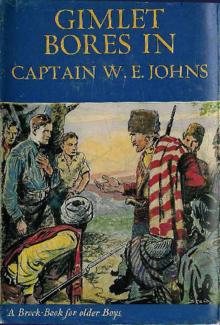 07 Gimlet Bores In
07 Gimlet Bores In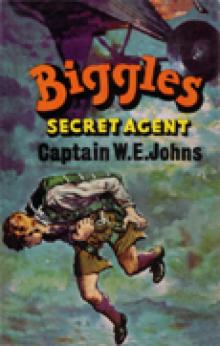 19 Biggles Secret Agent
19 Biggles Secret Agent 32 Biggles In The Orient
32 Biggles In The Orient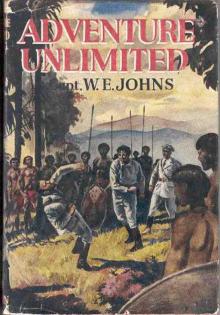 Adventure Unlimited
Adventure Unlimited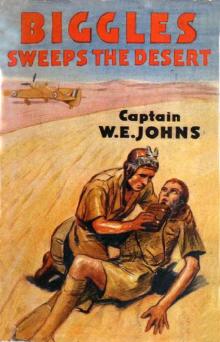 26 Biggles Sweeps The Desert
26 Biggles Sweeps The Desert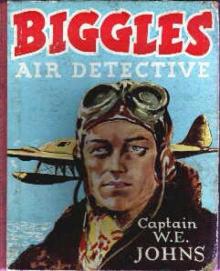 Biggles Air Detective (43)
Biggles Air Detective (43) 36 Biggles Breaks The Silence
36 Biggles Breaks The Silence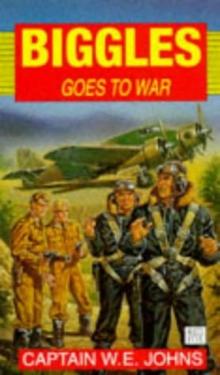 14 Biggles Goes To War
14 Biggles Goes To War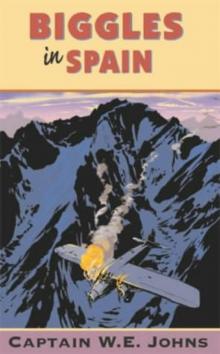 18 Biggles In Spain
18 Biggles In Spain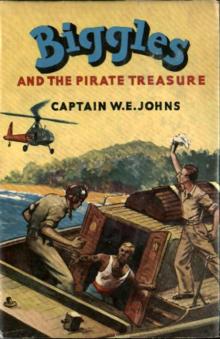 50 Biggles and the Pirate Treasure
50 Biggles and the Pirate Treasure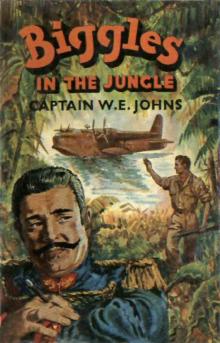 25 Biggles In The Jungle
25 Biggles In The Jungle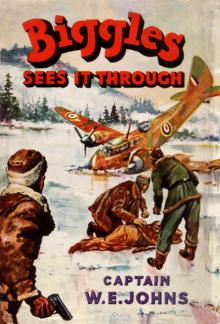 23 Biggles Sees It Through
23 Biggles Sees It Through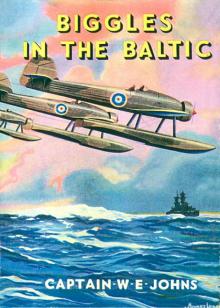 21 Biggles In The Baltic
21 Biggles In The Baltic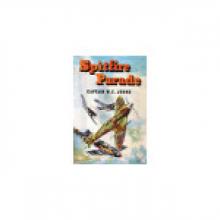 24 Spitfire Parade
24 Spitfire Parade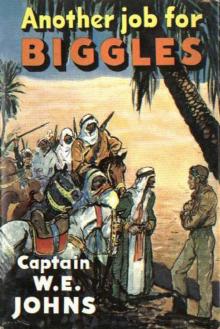 38 Another Job For Biggles
38 Another Job For Biggles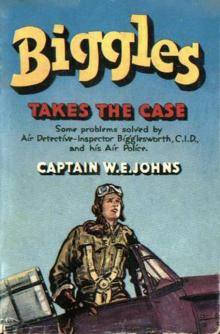 41 Biggles Takes The Case
41 Biggles Takes The Case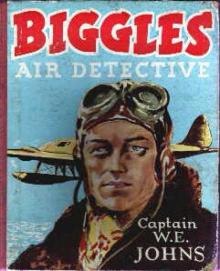 43 Biggles Air Detective
43 Biggles Air Detective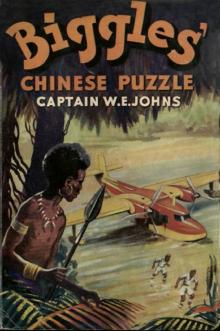 53 Biggles Chinese Puzzle
53 Biggles Chinese Puzzle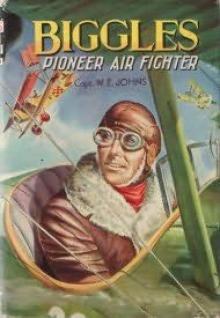 Biggles Pioneer Air Fighter (51)
Biggles Pioneer Air Fighter (51)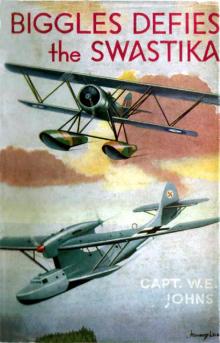 22 Biggles Defies The Swastika
22 Biggles Defies The Swastika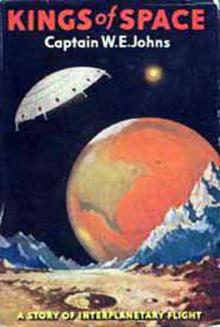 01 Kings Of Space
01 Kings Of Space